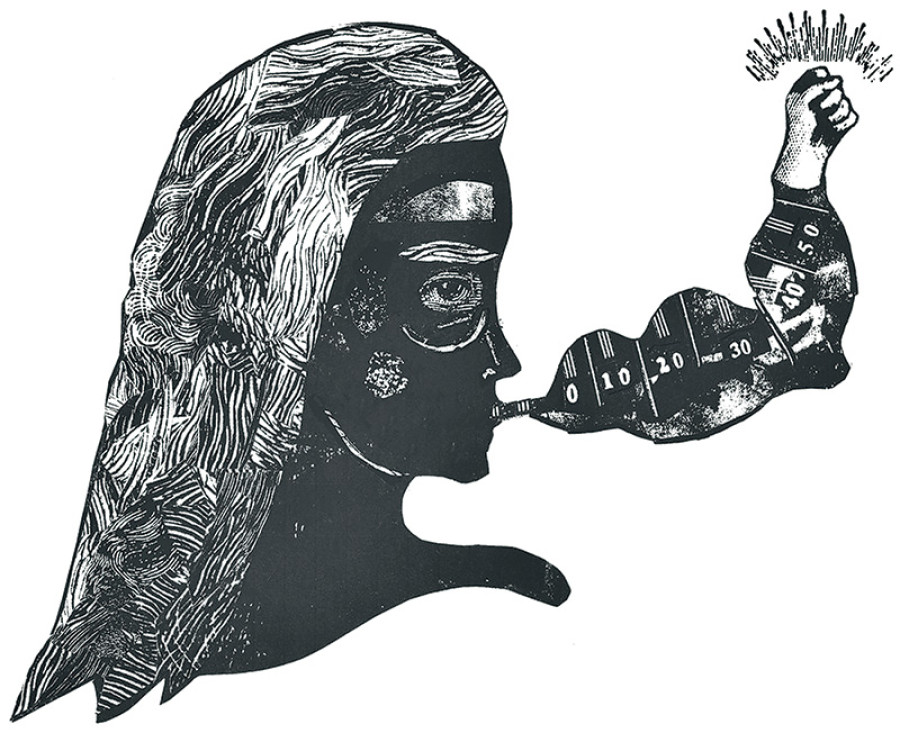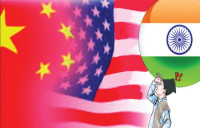Opinion
That is so unfair
Among the 18 ministers and four state ministers in Prime Minister KP Sharma Oli’s Cabinet, there are three women—Beena Magar, Padam Kumari Aryal and Ram Kumari Chaudhari—which is well below the constitutional provision of 33 percent representation. The reluctance to appoint women to high positions is a clear sign of the patriarchal grip in society and the social, political and economic structures.
Asmita Verma
Among the 18 ministers and four state ministers in Prime Minister KP Sharma Oli’s Cabinet, there are three women—Beena Magar, Padam Kumari Aryal and Ram Kumari Chaudhari—which is well below the constitutional provision of 33 percent representation. The reluctance to appoint women to high positions is a clear sign of the patriarchal grip in society and the social, political and economic structures.
Women in Nepal have achieved whatever they have achieved after a long and arduous struggle. But they still have to go a long way in order to experience equal status in the social, political and economic structures. First, there has to be elimination of the unfavourable environment, proper achievement of rights, representation and access to resources and change from a reactive approach to a proactive approach.
Prime Minister Oli is vocal and outspoken. He speaks his mind on a variety of issues. But how often has he spoken about women’s issues and their elevation in the social, political and economic structures?
In recent times, we have seen world leaders ranging from the former US president to the Canadian prime minister advocating for women’s rights like reproductive rights, property rights and equal pay for equal work. Advocacy by people of such global stature has certainly elevated women’s cause to new heights, but has that drastically changed the situation for women? In many ways, women’s issues have advanced in general.
Uequal reward
In Nepal’s case, has Prime Minister Oli, or for that matter any leader holding a high political position, spoken or taken a stand for women’s cause or willingly facilitated the rise of their female counterparts? They have certainly advocated and pushed for their women kith and kin.
But strong headed women politicians such as Mangala Devi Singh, Sahana Pradhan and Shailaja Acharya had to die a political death in the absence of a conducive environment. We have male political leaders who continue to hold prominent political posts on the basis of their political dividend from past movements.
But the status of female leaders who fought shoulder to shoulder with them in these movements has been rendered valueless. As a result, emerging women leaders are wary about treating politics as a fulltime and lifelong career.
Women have fought for their |political and civil rights all around the world. The journey has been quite a rollercoaster ride for them since all these rights didn’t come to them at once. It took quite a while for them, for example, to achieve voting rights and hence other political rights.
It should be an achievement for Nepali women that they achieved voting rights simultaneously with the rest of the citizens in 1959 when Nepal held elections for the first time. With voting rights, the status of women was further enhanced, and women now enjoy various civil and political rights including 33 percent representation in all sectors.
Misused benchmark
Although the 33 percent representation ensures quantitative aspects, it would be interesting to see if that has brought qualitative transformation in women’s lives. Considering the number of women appointed to the Cabinet and the number of women candidates elected to various levels recently, there has been no substantive value addition to equality.
According to constitutional provisions, the chairperson or the vice-chairperson of local bodies has to be a woman, but all political parties fielded women candidates for the post of deputy chairpersons. The provision was meant for empowering women, but the very provision has been used to relegate their representation to a subordinate position.
Women have historically been deprived of resources such as finance and positions of power and prominence. But with their relegation to mere deputies, they have been made vulnerable because of their male bosses and their machismo. Lack of access to resources and limited decision making powers takes away their freedom. Our society is replete with examples of women achieving positions of power due to the patronage of men in the political sphere. Therefore, they are not defenders of women’s rights but just the opposite.
There are two courses of action to help bring change: Empowering women so that they get more freedom and independence, and building supportive social, political and economic structures to enhance women’s status. First, women cannot remain as reactive agents and be satisfied with whatever they are given.
This, of course, is agreeing to further oppression. Instead, women have to support each other and seek support from other women across all strata and levels. Women should not try to establish matriarchy by replacing patriarchy. They should work with supportive men and seek to create an environment of equal respect and opportunity.
Second, acknowledging the fact that there has been historical and structural oppression against women at the family, society and national levels is the first step in correcting inequality. On the basis of this enlightenment, new structures that support and nurture equally important roles for men and women should be created.
Finally, Nepali women didn’t have to launch any suffragette movement to get their political rights like women in the UK and US. But our women are far from enjoying the extensive rights that women in the West enjoy.
This is mainly because of the patriarchal, social and political structures as much as the notion of oppression that women in our society themselves nurture. Thus, only constitutional and political guarantees will not be sufficient for women’s emancipation; a well thought-out action at all levels and from all stakeholders is needed.
Verma is completing Master’s in international relations from Amity University, New Delhi




 14.07°C Kathmandu
14.07°C Kathmandu










